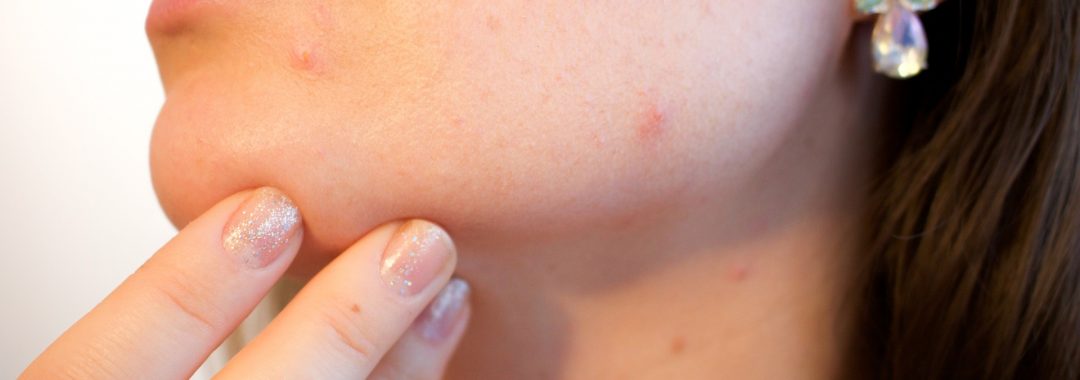Polycystic ovary syndrome (PCOS) is the most common reproductive/endocrine disorder — and most common cause of infertility — affecting 9 -18% of women around the world. One of the major signs that you may have PCOS is acne on the face, or other parts of your body. Many women will have this one symptom overlooked and then have a major reproductive/endocrine disorder overlooked as well.
Despite the prevalence of this chronic condition, one-third of women diagnosed with PCOS saw at least three health professionals over the course of two years before receiving a diagnosis, according to a study from the University of Pennsylvania.
Polycystic Ovaries (PCO) is a characterised by multiple cystic growths on the ovaries. In large it is an endocrine and hormonal disorder, but it has potential to cause gynaecological and reproductive issues and these issues can be varied. Women with PCOS may not have cystic formation and just have symptoms that are part of the syndrome only (eg-acne, irregular cycle). PCO and PCOS really are two different conditions, but now they are both put under the one title of PCOS and this actually isn’t correct. Some women only have the cysts (PCO), while others have no cysts but have the syndrome (PCOS). Some have both. The one thing that they all have in common is that they all have insulin resistance. The other thing we know is that there is usually a family member with the same condition whom has passed the condition on genetically. Often the family member passing on the genetic traits, doesn’t even know that have the condition in the first place.
Recent studies have shown that there are “major gaps” in education and support for women with these conditions (PCO and PCOS). We see the same thing with other gynaecological conditions such as endometriosis and Adenomyosis and why these conditions can take up to a decade to be diagnosed properly
As a healthcare practitioner, I see these same issues with so many women waiting years to get a proper diagnosis and they have seen multiple healthcare professionals in both the medical and complementary medicine profession. It also creates confusion and anxiety for women who just want an answer to their condition and are not being diagnosed properly and also getting conflicting advice and treatment in the interim.
The signs and symptoms of PCOS are very clear and easily diagnosed, but many healthcare professionals end up focussing on one symptom, while overlooking the bigger picture and then these poor women get their condition missed.
Acne is one of the major signs of having PCOS and many women have his overlooked, or unaware that they may have a condition that could affect their fertility later on. If a women presents with Acne, irregular periods etc, I know there is a very good chance that she could have, or actually has PCOS. The problem for these women, as explained before is that healthcare providers and placing too much emphasis on only one of these symptoms, which is usually the Acne, or just that the cycle is irregular. Then women are then put on the Pill and these symptoms are masked for years, until they try and have a child and have difficulty doing so. The other issue is that the acne is often the focus, due to vanity reasons, and this is also why the many of the treatments for the acne are not working, because they are failing to treat the root cause of the issue. It just becomes one big vicious circle that goes round and round until someone finally diagnoses the actual cause properly.
Women with PCOS also have an increased risk of type 2 diabetes, gestational diabetes, metabolic syndrome and anxiety and depression, and studies have shown that the longer it takes for the condition to be diagnosed, the longer the patients condition begins to affect both their physical, emotional and reproductive health
The most common signs of PCOS are:
- Absent, Irregular and Inconsistent menstrual periods,
- Acne
- Excess hair growth (some women can have hair loss too)
- Central obesity
But many women with PCOS are of normal body weight and can actually be underweight too. It can affect women of any shape, weight or size. Some women with PCOS have regular menstrual cycles and can be fairly asymptomatic (meaning no symptoms) too
Just like endometriosis, women with PCOS are often missed and dismissed and the impact this has can be significant psychologically and also significant on their future fertility. There needs to be better health professional resources and international dissemination to improve diagnosis, education, management and reproductive and health outcomes.
I am always saying to healthcare professionals (medical and complementary medicine) that if you don’t know how to do your job properly, you don’t know how to diagnose conditions like PCOS or Endometriosis properly, or it is out of your scope of practice, get out of the way and refer these women onto people who are trained to diagnose and manage these conditions properly.
Lets, help put and end to PCOS and also put an end to Endometriosis and other inflammatory gynaecological conditions as well. Let’s break the silence and help women get the diagnosis and care they need. Early intervention and treatment is crucial for any disease state and let’s help women get this care sooner.
Take care
Regards
Dr Andrew Orr
-Women’s and Men’s Health Advocate
-“Period Pain IS NOT normal”
-“Leaving no Stone Left Unturned”




